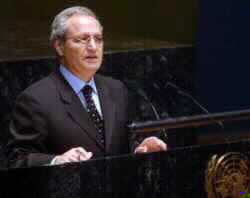Syria said on Sunday "blind bias" was behind threats against Iraq at a time when Israel violates U.N. resolutions, possesses nuclear weapons and uses U.S. weapons against Palestinians under occupation. "Why should the world request Iraq to adhere to Security Council resolutions, while Israel is allowed to be above international law?" Syrian Foreign Minister Farouq al-Shara told the U.N. General Assembly in New York.
"We see no justification for igniting a new war in the Middle East. We strongly believe that striking Iraq, which no longer occupies the lands of others, while keeping silent about the Israeli occupation ... represents blind bias and a distorted vision of the real situation," he added.
President Bush told the United Nations last week that it must enforce U.N. resolutions against Iraq or unspecified action would be unavoidable. U.S. officials say ousting Iraqi President Saddam Hussein is the best solution.
Arab countries say they oppose the use of force against Iraq but Shara's speech was the strongest statement in New York so far of the Arab view that U.S. policies toward Iraq and Israel, a U.S. ally, show a double standard.
This year alone, the U.N. Security Council has demanded several times that Israel end its incursions into Palestinian cities, which have continued despite the calls.
Israel also blocked a U.N. attempt to investigate the facts about killings during Israeli actions inside a Palestinian refugee camp in the West Bank town of Hebron, saying it could not accept U.N. terms for the mission.
"APPETITE FOR HEGEMONY"
Arabs say Israel has violated since 1967 U.N. Security Council resolution 242, which calls for withdrawal from territory occupied in the June 1967 war. Israelis says it has complied by withdrawing from some of the territory.
Shara said the world was in a state of confusion and tension because of "an increasing tendency toward practices that are characterized by unilateralism and an appetite for hegemony over the fortunes of others" -- a reference to the role of the United States as the most powerful country.
But he confined direct criticism of Washington to its refusal to stop giving Israel arms used against Palestinians.
"It is indeed odd that the United States considers Israel acting in self-defense in occupied territories that are acknowledged to be occupied by Security Council resolutions which the United States played a role in drafting," he added.
Washington's main argument against Iraq is that it is developing weapons of mass destruction and may hand them over to extremists for use against the United States.
But Shara said: "It is regrettable that some parties only focus on certain Arab or Muslim countries, ignoring in the meantime the nuclear arsenal that Israel possesses."
Israel is reported to have 200 nuclear warheads but Israeli officials refuse to confirm or deny their existence.
Syria repeated an Arab offer to make the Middle East a region free of weapons of mass destruction, provided that Israel also agrees and opens its nuclear plants to inspection.
Bahraini Foreign Minister Sheikh Mohammad bin Mubarak al-Khalifa later joined the call for inspections in Israel.
"We call upon the United Nations to press Israel to accede to the Nuclear Non-proliferation Treaty, with all its nuclear facilities being subject to the IAEA (International Atomic Energy Agency) comprehensive safeguards system," he said.
Challenging the U.S. policy of "regime change" in Iraq, Shara said only the Iraqi people should decide their future, without any interference in their internal affairs.
PHOTO CAPTION
Faruok Al-Shara, Syrian Deputy Prime Minister and Minister of Foreign Affairs, speaks before the United Nations General Assembly meeting in New York, September 15, 2002. REUTERS/Chip East
- Author:
News Agencies - Section:
WORLD HEADLINES


 Home
Home Discover Islam
Discover Islam Quran Recitations
Quran Recitations Lectures
Lectures
 Fatwa
Fatwa Articles
Articles Fiqh
Fiqh E-Books
E-Books Boys & Girls
Boys & Girls  Articles
Articles










